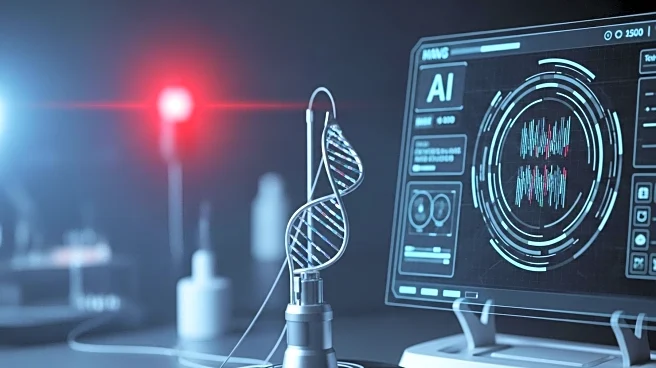What's Happening?
Artificial intelligence is increasingly being used in biotechnology to design proteins and viruses, raising concerns about the potential for creating bioweapons. A study led by Eric Horvitz, chief scientific officer at Microsoft, explored whether AI could design proteins that mimic dangerous ones without being detected by conventional screening methods. The study found that AI-designed proteins could evade current screening processes, although the redesigned proteins were not actually created. Additionally, a team at Stanford University attempted to redesign viruses that infect E. coli, but only a small fraction were successful. Despite these findings, the risk of AI-designed bioweapons remains low, as traditional methods of obtaining toxins like ricin are still accessible.
Why It's Important?
The use of AI in biotechnology has significant implications for public safety and biosecurity. While AI offers advancements in drug and vaccine development, its potential misuse in creating undetectable bioweapons poses a threat. The study highlights the need for improved screening methods and regulatory measures to prevent the misuse of AI in designing harmful biological agents. The risk of bioterrorism using AI-designed viruses is currently low, but as technology advances, the threat could increase, necessitating vigilance and proactive measures to safeguard against potential bioweapon development.
What's Next?
Future steps may involve enhancing DNA synthesis screening processes to better detect AI-designed proteins and viruses. There is also discussion about developing AI tools that can identify and prevent the creation of dangerous biological agents. As benchtop DNA synthesizers become more accessible, regulatory frameworks may need to be updated to address new risks. Stakeholders in biotechnology and public health will likely continue to monitor developments in AI applications to ensure safety and prevent misuse.
Beyond the Headlines
The ethical implications of using AI in biotechnology extend beyond immediate safety concerns. The ability to redesign biological agents raises questions about the balance between innovation and security. As AI technology progresses, the scientific community may need to address the moral responsibilities associated with its use in potentially harmful applications. Long-term, the integration of AI in biotech could reshape how biological research is conducted, with increased emphasis on ethical standards and global cooperation to prevent misuse.









